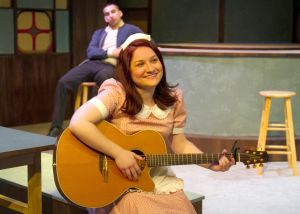‘Dogfight’ in Anaheim Hills zeroes in on Vietnam War’s complexities
by Eric Marchese, Orange County Register

Many contemporary new musicals, whether large scale or small, are based on a major movie or some other well-known cultural touchstone.
That makes the new musical “Dogfight” refreshing, because the outstanding film on which it’s based is so obscure.
In basing their 2012 stage musical on that 1991 movie, and on Bob Comfort’s skillful, insightful screenplay, Peter Duchan (book) and composers Benj Pasek and Justin Paul have created an intimate look at a much simpler America about to grow uncomfortably darker and more complex.
Chance Theater’s Orange County and Los Angeles premiere staging is thought-provoking, its themes transcending director Matthew McCray’s deliberately minimalist presentation.
The small-scale, off-Broadway show is ideal for Chance, and the company’s typically solid production values, set design, music direction, choreography, and ensemble singing and acting work are just what’s needed to evoke the period.
It’s Nov. 21, 1963, and young U.S. Marine Eddie Birdlace (Andrew Puente) and his buddies are on the loose in San Francisco during their last 24 hours stateside before shipping out to Okinawa and, from there, heading to “a little country called Vietnam.”
Throughout “Dogfight,” Eddie, a cheeky smooth talker, is joined by cocky Texan Ralphie Boland (James McHale) and skinny, bespectacled Dickie Bernstein (Jonathan Rosario), his two best pals, and a few others from their company.
The buddies are on a mission that involves playing a game they call “Dogfight”: Each will bring a girl to a sleazy club in the Mission district, and each will kick in $50. The club’s owner will select the ugliest girl and the pot will go to the Marine who brought her.
Eddie selects Rose (Ashley Arlene Nelson), a folk musician who waitresses at a diner, as his at-first reluctant date. Rose isn’t ugly at all – just shy, plain, and somewhat awkward. And there’s the rub: As he gets to know her, Eddie is moved by her sweetness and sincerity and has second thoughts about choosing her.
The cruel game backfires on Eddie when Rose discovers his reasons for asking her out, setting up a second half that traces the couple’s growing romantic involvement against the backdrop of the young Marines preparing to ship out.
The show’s script and songs effectively show the contrast between the brashness of the young soldiers before shipping out and the mixture of self-doubt and loss they feel after returning home from the war.
We also get a strong dose of the rejection and sense of betrayal the young Marines felt upon returning home: Not only were they not welcomed as heroes; they were scorned and condemned by peers, many who were products of the counterculture.
This sense of tragedy and complexity pervades the show’s book and often insightful lyrics. If the score itself is sometimes grating, it’s because it wants to please the ears of today’s theater audiences instead of evoking the music of its historical period.
The first major musical number, “Some Kinda Time,” elicits an enjoyably rowdy mood and a sense of elation felt by the young Marines eager for adventure while on leave, and Puente and Nelson essay some deeply emotional solos.
Puente’s Eddie is aptly duplicitous, egotistical and obtuse, without a clue as to how to treat women – yet he’s genuinely moved by Rose, which gets us rooting for him to win her over. McHale’s Boland is a boastful, unpretentious good old boy and Rosario’s Bernstein is touchingly green.
Kim Dalton’s tough, streetwise Marcy, the hooker Boland hires as his date, is comically impudent and mercenary, and the seven ensemble members essay numerous roles, with Robin Walton notable as a sleazy, vocally challenged lounge singer.
Nelson etches the evening’s most unforgettable portrait. Her Rose’s low self-esteem and desire to actuate the ideals found in folk music are affecting and appealing, and Nelson and Puente are endearingly awkward in the tasteful bedroom scene.
Music director Taylor Stephenson and the four-piece offstage combo capture the divergent emotions of the show’s score, and Angeline Mirenda’s dance steps make good use of Christopher Murillo’s multi-level scenic design.
It’s instructive, and symbolic, that the play takes place on the day before President Kennedy’s assassination, an event that broke the nation’s heart and changed the course of history.
That makes “Dogfight” a microcosm for the wrenching changes brought to American society by the death of a young leader and the complexities of a war many are still struggling to comprehend.
Leave a Reply
